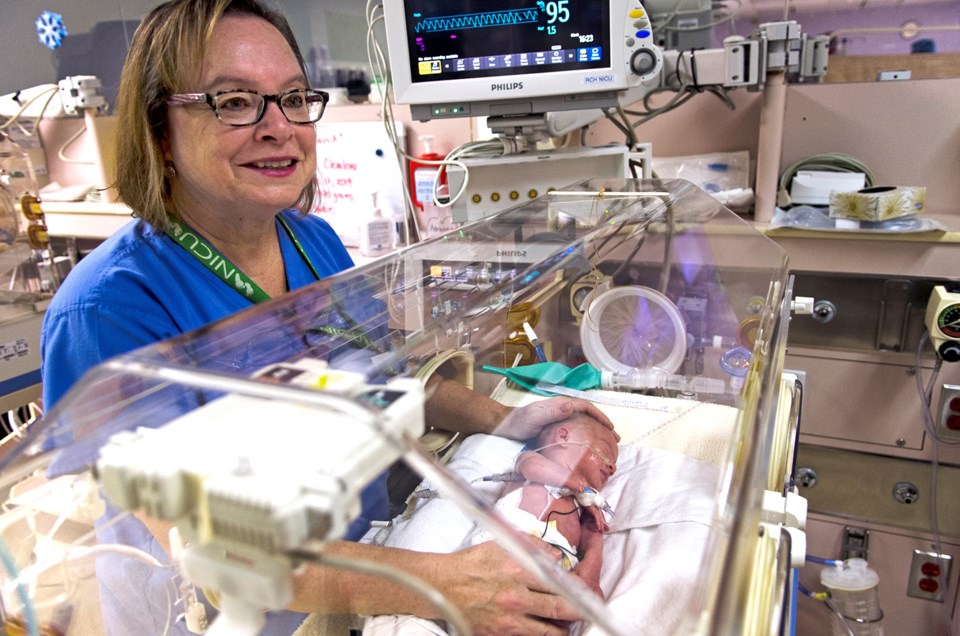Before the break of dawn this Christmas, Karen Maloney left her bed, crept out of her darkened house and drove to Royal Columbian Hospital.
By the time families around the Lower Mainland started tearing into presents around their livingroom trees, the veteran nurse had stepped onto the floor of the neonatal intensive care unit (NICU) for what could be her last Christmas shift.
She retires next month after 37 years, and she’s lost count of how many Christmases she’s spent caring for some of the hospital’s most vulnerable patients – tiny babies born as many as 16 weeks premature and poised for a time between life and death.
“They need a lot of help at the beginning,” she says.
Despite that – or maybe because of it – Christmas in the NICU has always been a magical time for Maloney.
It’s not an easy thing for her to explain, even to young nurses nervous about working their first holiday shift.
“I’ve more or less said, ‘It’s just a very special time and you’ll understand when you get here.’”
Not that all neonatal nurses will get a chance to escort a baby through a snowstorm on Christmas Eve like Maloney did early in her career at Prince George Regional.
As part of the hospital’s transport team, she had been assigned to help return a baby via ambulance to its parents in Smithers almost 400 kilometers away.
“We were sailing along, and I felt like we were on a sleigh,” Maloney says. “It was a magic night. We got to Smithers Hospital, the parents were there and I said ‘This is your gift from the Prince George Regional Hospital.’ I handed them this baby, and I just sat down and started crying. It was beautiful.”
On the other end of the spectrum, Maloney remembers a particularly tough Christmas Day at RCH about 10 years ago.
The unit was filled to capacity but the babies kept coming.
“They were all quite ill, and we were just running around like crazy just trying to make sure that everyone had the best care possible,” Maloney says.
A Christmas potluck remained untouched and Maloney ended her shift completely spent.
“When I got home, I was totally exhausted, so I had nothing left for my husband and daughter,” she says. “I learned a lot from that.”
Now she tells the younger nurses to plan their own holiday celebrations another day if they’re scheduled to work the Christmas shift.
Whether the day is magic or mayhem, Christmas at the NICU is all about family, according to Maloney, and that has taken the sting out of absenting herself from her own family all those years.
“You’re leaving your home, but you’re going to your other home,” she says.
Christmas or not, the NICU is basically an emergency room for babies, and Maloney’s team has to be ready for anything that comes through the doors, but the unit’s tiny patients often stay between six and nine months, so there are a lot of familiar faces when the holidays roll around.
Those bonds are especially close for nurses, like Maloney, who sign up to care for individual infants for the duration of their stay.
“Every time we come to work, we’re assigned to that baby and family,” she says. “They really get to know us and we get to know their baby and what their baby’s needs are.”
It can be intimidating at first for new parents at Maloney’s unit to interact with their tiny, incubator-bound babies who sometimes seem like “more machine than baby.”
So Maloney and her fellow NICU nurses show parents how to lay firm, comforting hands on their newborns through the incubator portholes.
They encourage them to change diapers and spend time holding their babies skin-to-skin whenever possible.
Along with new technologies in the NICU, such family-centred care has evolved dramatically during Maloney’s 37 years on the job.
When she started, she remembers older nurses talking about a time only a few years before when even parents with uncomplicated births could only look at their newborns through nursery windows.
“It’s been a total change from the beginning till now,” she says.
This more-human approach is especially evident at Christmas.
Staff breaks out special Christmas linen for the incubators, and the babies are outfitted with festive toques and get tiny stuffies as gifts.
Parents are greeted with a Christmas photo of their newborn – taken by Maloney.
She began the tradition about 10 years ago, taking pictures of each baby in the unit and presenting them to parents in a special card.
Sometimes those parents are miles away in Vernon or Fort Nelson and can’t make it to New West for the holiday.
“They’re relying on us to make a nice Christmas for their little one,” Maloney says, “and they feel good about it because they’ve gotten to know us.”
Sometimes her reward comes years later in the form of a Christmas card with a photo of one of the unit’s “graduates” – a man or woman Maloney might once have held in her hands when he or she weighed just one pound and was struggling to stay alive.
“They’ve been dancing or have graduated from university,” Maloney says, describing photos that have arrived over the years.
It’s rewarding work, she says, and not something she’s ready to leave behind completely.
Come February, she’ll be back at the unit part time.
“I do love my work,” she said. “Not everyone can say that.”



